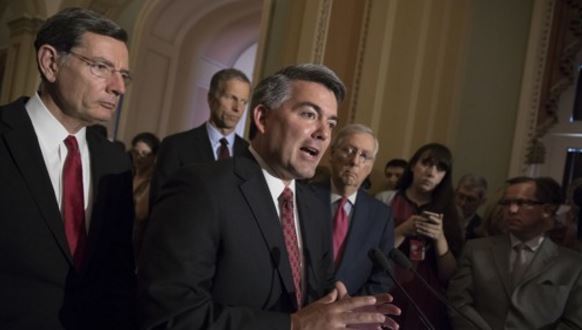The United States will do everything it can to stop North Korea's nuclear and missile programs even if it means the use of military force, an influential senator said Tuesday.
 |
Sen. Cory Gardner (Yonhap) |
Sen. Cory Gardner (R-CO), chairman of the Senate Foreign Relations Subcommittee on Asian and Pacific Affairs, made the remark during a conference hosted by the Center for Strategic and International Studies, saying Washington remains committed to defending it allies in the region.
"I believe US policy toward North Korea should be straightforward," he said in a keynote speech. "The United States will deploy every economic, diplomatic, and if necessary, military tool at our disposal to deter Pyongyang and to protect our allies."
Washington has stood for a denuclearized Korean Peninsula since 1992, and even though it hopes to achieve the goal through peaceful means, "all options are on the table," the senator emphasized.
Gardner authored the North Korea Sanctions and Policy Enhancement Act, which was the first bill to exclusively target North Korea and pass through both chambers of Congress before being signed into law last year. The legislation calls for imposing mandatory sanctions on those assisting Pyongyang with its nuclear and missile programs, cyber-attacks, human rights abuses and imports of luxury goods.
The senator blamed China for North Korea's continued provocations and urged it to do more to rein in the regime.
"Despite the Trump administration's earnest efforts to induce China to action, China's response has been lacking," he said.
"China must move beyond an articulation of concern and lay out a transparent path of focused pressure to denuclearize North Korea."
He accused China also of engaging in a "shameful economic sanctions campaign" against South Korea for hosting the US THAAD missile defense system, which "in no way threatens China, and Beijing knows this."
Gardner made an apparent reference to Seoul's recent offer to hold talks with Pyongyang.
"Before any talks, we must demand Pyongyang first meet the denuclearization commitments that it had already agreed to and subsequently ... violated," he said. (Yonhap)








